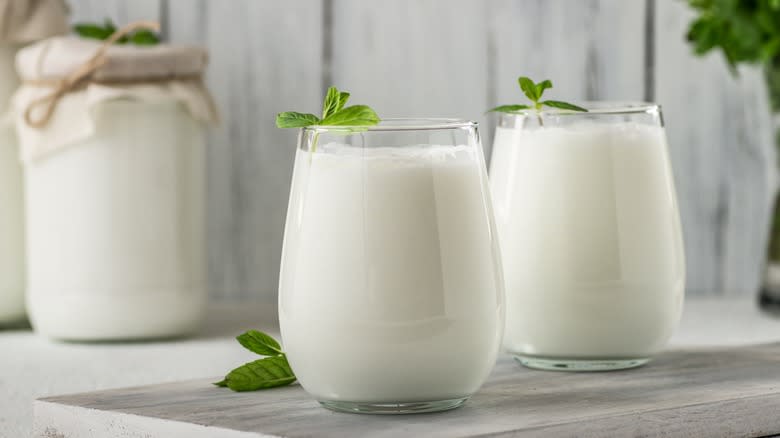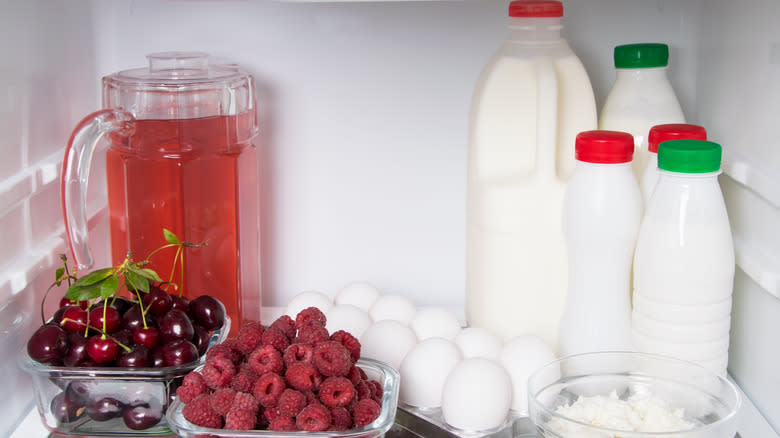Here's How Long Kefir Should Stay Good For After Opening

If you're a purveyor of probiotics, you're likely familiar with kefir. A fermented milk beverage likened to a drinkable yogurt, this cultured refreshment is tangy and satiating and offers plenty of potential health benefits from improved digestion to protection against bacterial infections. Seeing that it's equal parts delicious and nutritious, you should drink more kefir, but if you want to maximize its quality, you need to know how long it lasts after opening.
Just because it's a fermented food product, doesn't mean it can't spoil. Unopened commercial-grade kefir typically lasts about a week after its sell-by date. But once you unscrew the lid, it's a slightly different ballgame. When properly stored, opened kefir stays fresh for up to five days. Although it might be tempting to reach for your kefir beyond its lifespan, consuming spoiled milk beverages facilitates food poisoning. Enjoy your probiotics when you can, and plan your kefir consumption around its expiration.
Read more: 13 Canned Foods You Should Avoid At The Grocery Store
Appropriate Kefir Storage

Whether opened or unopened, you should always store kefir in the refrigerator. Leaving kefir at room temperature is an easy way to hasten bacterial growth, which degrades the quality of the drink and increases the risk of foodborne illness. But what temperature should you set your refrigerator? Ideally, your refrigerator should be at about 37 degrees Fahrenheit. Because warm air rises the climate is milder at the top of your fridge, and frequent opening lets room temperature air into the front, so consider keeping kefir near the bottom back part where it's coldest. You can freeze kefir to lengthen its shelf-life, but this can degrade its texture and flavor. Note that you should always thaw frozen kefir in the refrigerator and never at room temperature.
If you make homemade kefir, it's important to store the liquid in an air-tight container to preserve its flavor and quality. A mason jar, a lidded food storage container, or a sealable plastic bag are all great options. If you are unsure if your store-bought kefir was sold in an air-tight container, safely transfer it to one you have at home.
Recognizing Signs Of Spoilage

At best, drinking spoiled kefir means consuming an ill-tasting beverage. At worst, you end up with a bout of food poisoning accompanied by stomach pain, vomiting, and other less-than-desirable symptoms. Either way, it's best to avoid it. If you're unsure whether or not your kefir has expired, here are some telltale signs.
Kefir has a fresh, tangy scent similar to a cup of yogurt. However, if you smell something rotten, acrid, and sour, it's time to replace your kefir. Fresh kefir is smooth, creamy, and silky in consistency, which means curdling and lumps and bumps are indicators of rot. Similarly, excessive separation of the milk liquids from the solids is another hallmark of expired kefir. Although it sounds elementary, moldy kefir or kefir that has developed visible organic growth should be thrown out immediately.
Whether you enjoy it as a beverage right out of the carton or use it as a tangy sour cream substitute, get the most out of your kefir by knowing how long it lasts, how to store it, and how to recognize signs of spoilage. Safe eating is happy eating.
Read the original article on Daily Meal.

